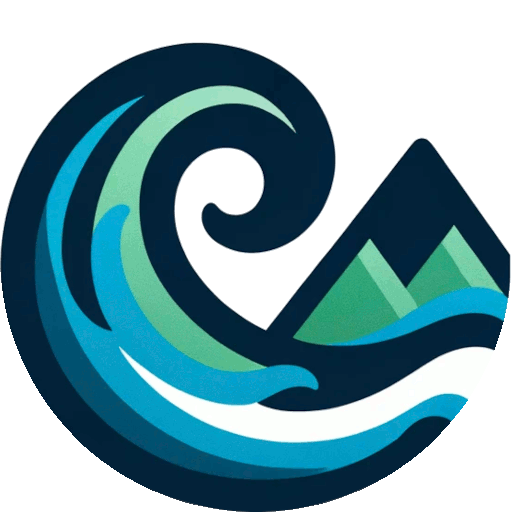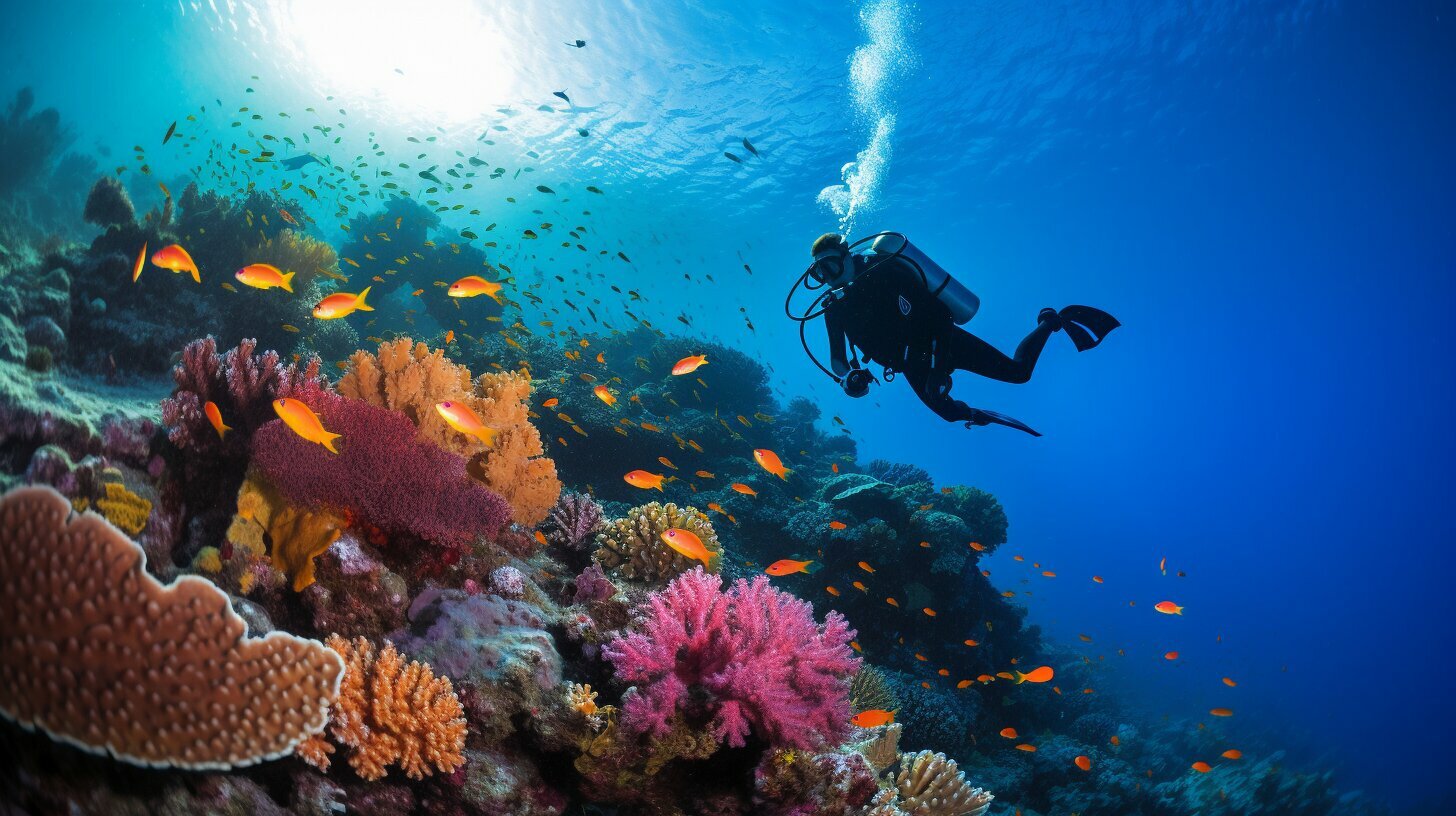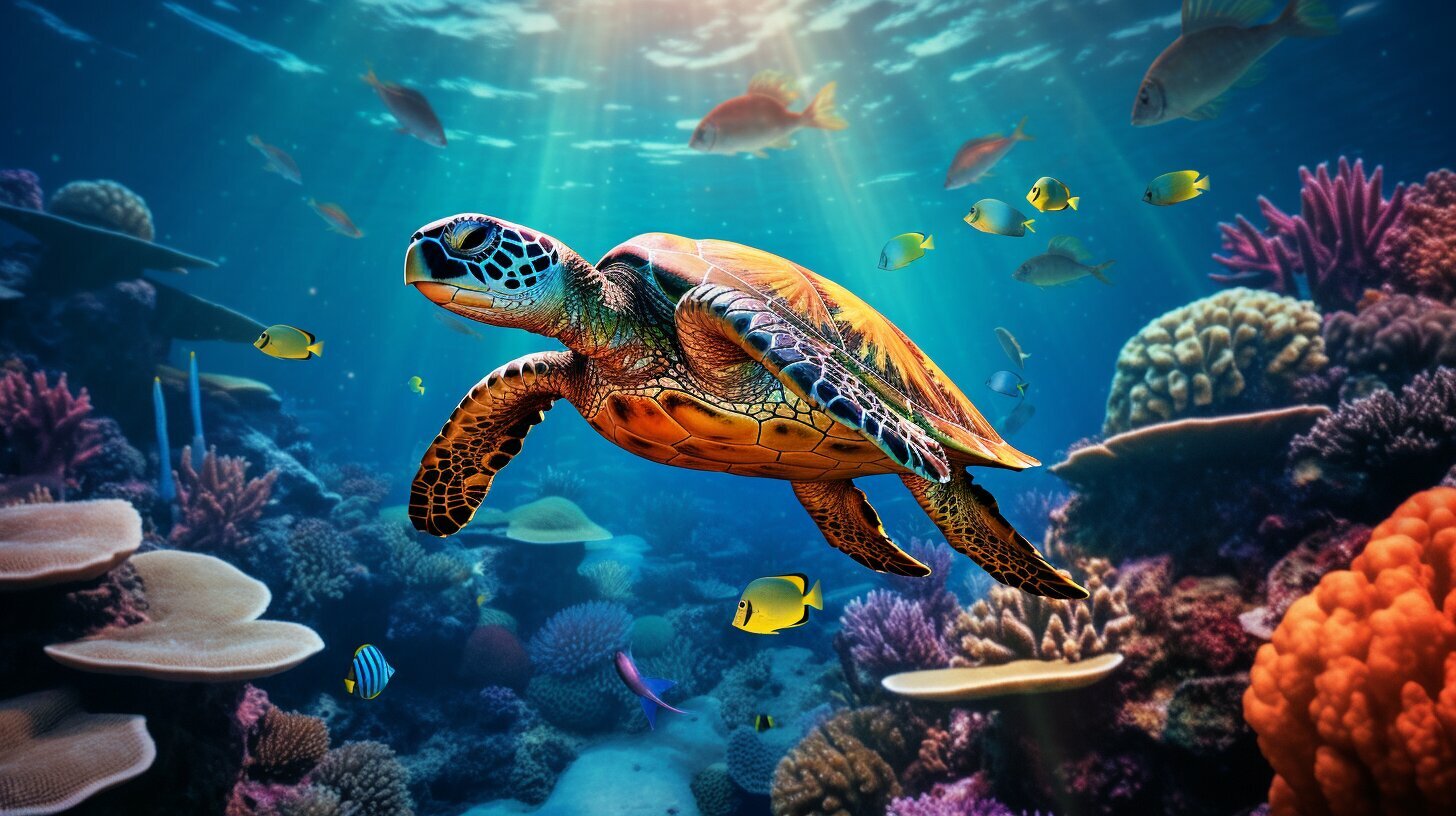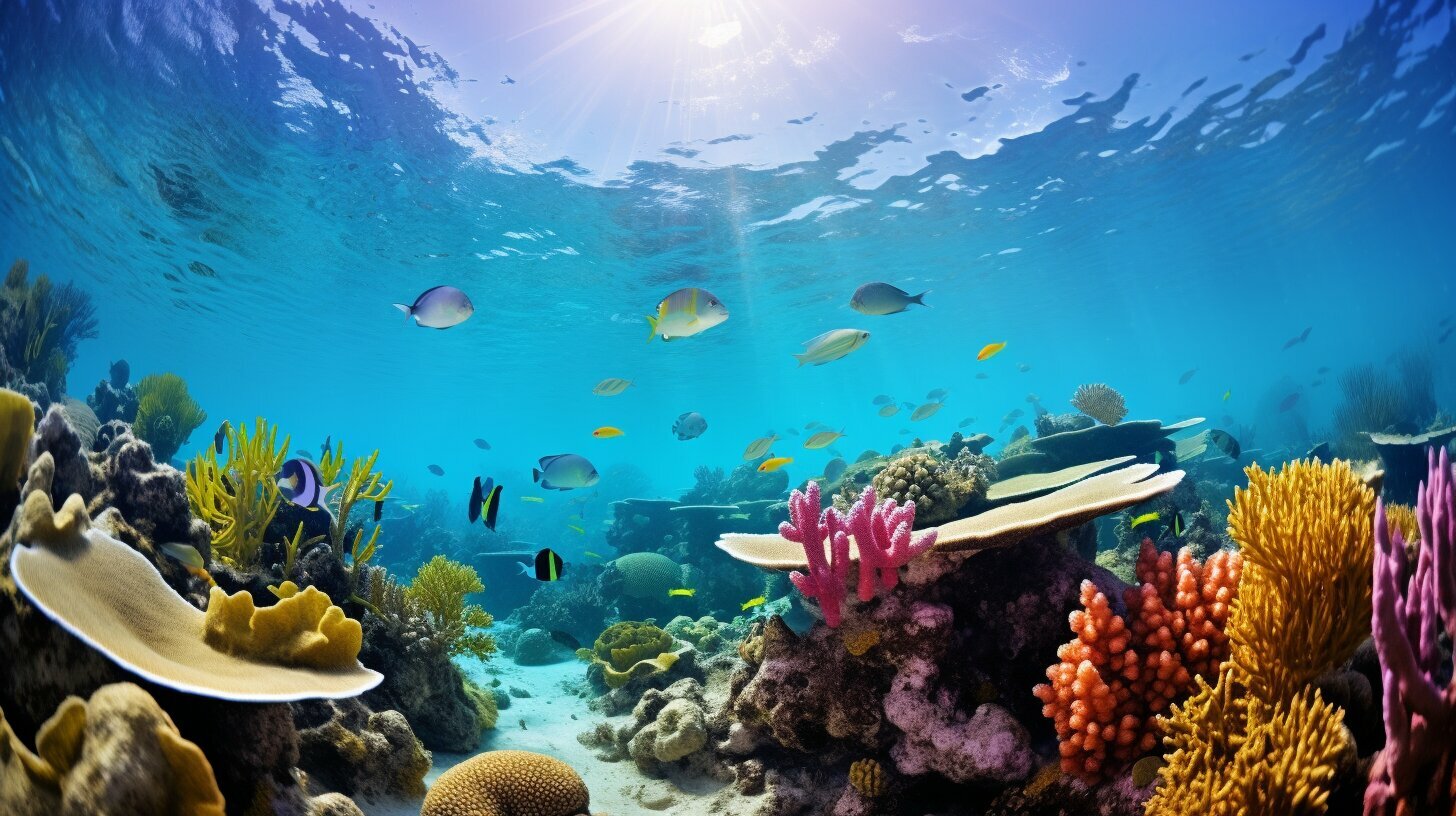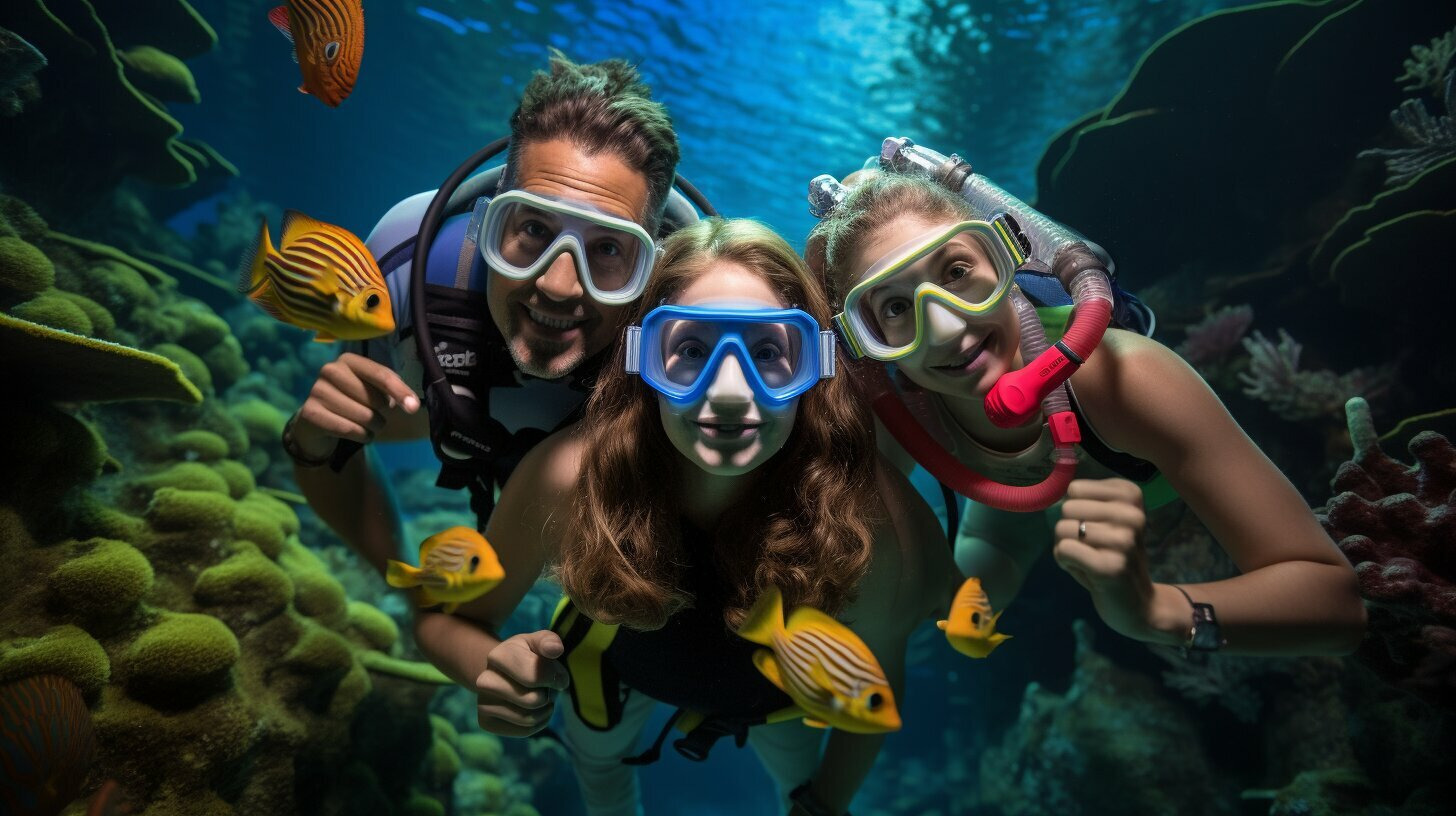If you’ve ever dreamed of exploring the depths of the ocean and seeing the incredible underwater world up close, scuba diving is the perfect adventure for you. Scuba diving for beginners can be intimidating at first, but with the right training and preparation, it can also be a safe and incredibly rewarding experience.
Before you dive in, it’s important to understand the basics of scuba diving for beginners, including the importance of scuba diving lessons and obtaining a beginner scuba diving certification.
Key Takeaways
- Scuba diving is an exciting adventure for beginners to explore the underwater world
- Proper training and obtaining a beginner scuba diving certification are crucial for safety
- Scuba diving lessons are necessary to learn essential skills and techniques
Why Scuba Diving is an Amazing Activity for Beginners
Scuba diving is an incredible activity that offers many benefits for beginners. Not only does it allow you to explore the fascinating underwater world, but it also provides an opportunity to get closer to marine life and experience a sense of weightlessness. Here are some essential scuba diving tips for beginners and some of the best scuba diving destinations to start your diving adventure.
Scuba Diving Tips for Beginners
When starting your scuba diving journey, it’s essential to learn a few basics that will help you get the most out of your experience. Here are some useful scuba diving tips for beginners:
Disclosure: When you buy through links on our site, we may earn an affiliate commission.
- Always listen to your instructor and follow their guidance.
- Practice your breathing techniques and learn how to control your breathing.
- Don’t dive beyond your skill level or certification level.
- Maintain proper buoyancy and practice good underwater navigation.
- Never touch or disturb marine life and observe safe diving practices at all times.
By following these tips, you can ensure that your diving experience remains safe and enjoyable.
Best Scuba Diving Destinations for Beginners
Choosing the right destination for your first dive is crucial to ensure a smooth and comfortable experience. Here are some of the top beginner scuba diving destinations around the world:
| Destination | Description |
|---|---|
| Florida Keys | The Florida Keys offer crystal-clear waters, ideal for beginners. You can spot colorful marine life, corals, and explore sunken shipwrecks. |
| Great Barrier Reef, Australia | The Great Barrier Reef is one of the world’s most popular diving destinations, offering stunning marine life and clear waters. The northern part of the reef is particularly beginner-friendly. |
| Hawaiian Islands | Hawaii is known for its diverse marine life and clear waters, making it a perfect destination for first-time divers. The island of Maui, in particular, offers excellent diving opportunities for beginners. |
| Cancun, Mexico | Cancun is a great destination for beginner divers, thanks to its calm and clear waters. You can spot numerous marine species, including sea turtles and colorful fish. |
| Red Sea, Egypt | The Red Sea offers warm waters and clear visibility, making it a favorite among beginner divers. You can spot an array of marine creatures, including dolphins, rays, and reef sharks. |
These are just a few of the many beginner-friendly diving destinations around the world. No matter where you choose to dive, always remember to prioritize safety and follow the guidance of your instructor.
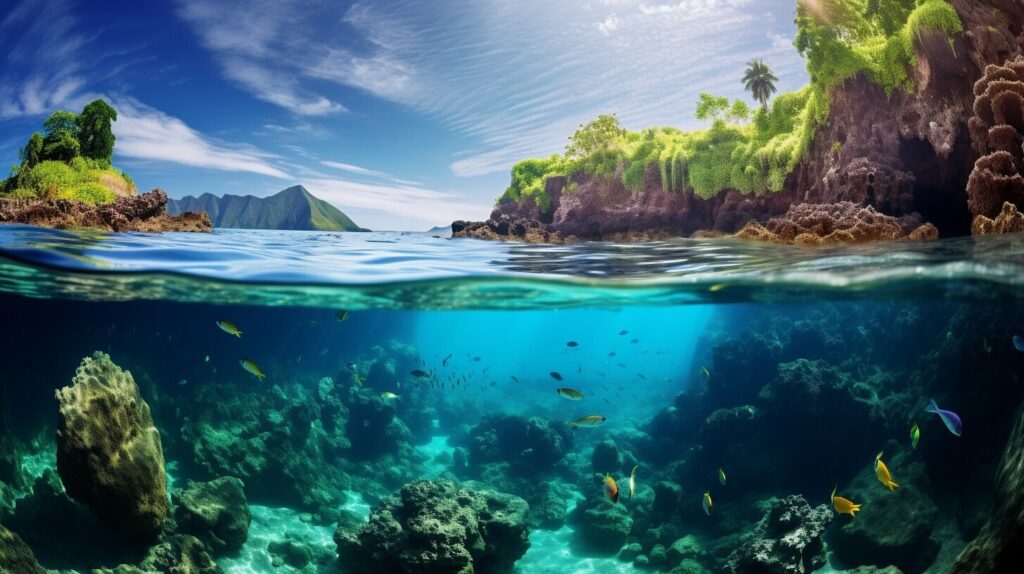
“Scuba diving is an exciting activity that offers many benefits for beginners. With the right training, gear, and safety measures, you can explore the underwater world and discover marine life like never before.”
Essential Gear for Beginner Scuba Divers
Scuba diving requires specialized equipment that allows you to breathe and move comfortably underwater. As a beginner, it’s essential to have the right gear to ensure a safe and enjoyable dive. Here’s a list of the essential beginner scuba diving gear:
| Gear | Description |
|---|---|
| Mask | A properly fitting mask is crucial for a clear view of the underwater world. Choose one that fits your face well and provides a comfortable seal for your nose and eyes. |
| Snorkel | A snorkel allows you to breathe air from the surface without having to use your scuba tank. It’s an essential piece of gear for surface swimming and conserving air while diving. |
| Fins | Fins help you move efficiently underwater and conserve energy. Choose fins that fit well and provide enough propulsion without causing leg cramps. |
| Regulator | The regulator is the device that delivers air from your tank to your mouth. As a beginner, choose a regulator that’s easy to use and has an octopus (emergency) second stage regulator. |
| BCD (Buoyancy Control Device) | The BCD helps you control your buoyancy underwater by inflating and deflating. Choose a BCD that fits well and has enough weight capacity to carry your gear. |
| Dive Computer | A dive computer is a device that tracks your dive time, depth, and decompression information. It’s an essential piece of gear for safe and efficient diving. |
| Wetsuit | A wetsuit helps protect you from cold water and provides buoyancy. Choose a wetsuit that fits well and provides enough insulation for the dive conditions. |
| Weight System | A weight system helps you achieve neutral buoyancy underwater. Choose a weight system that’s comfortable and provides enough weight to offset your buoyancy in the water. |
Remember, choosing the right gear is crucial for a safe and enjoyable dive. Always invest in quality gear that fits well and suits your diving needs. Happy diving!
Safety Guidelines for Beginner Scuba Divers
Scuba diving is an exciting activity, but it is important to remember that it comes with inherent risks. As a beginner scuba diver, it is essential to follow safety guidelines to ensure your dive is both enjoyable and safe.
Here are some scuba diving safety tips for beginners:
- Get certified: Before embarking on a scuba diving adventure, it is crucial to obtain a beginner scuba diving certification. This certification ensures you have the necessary skills and knowledge to dive safely.
- Plan your dive: Careful planning is essential for a safe dive. Make sure to check weather conditions, tide times, and water temperatures before diving. Additionally, create a dive plan with your buddy and stick to it.
- Check your gear: Inspect your gear before every dive to ensure it is in good working condition. Test your equipment in shallow water before diving to confirm that it works correctly.
- Dive with a buddy: Never dive alone, always dive with a partner. Diving with a buddy helps you to watch each other’s backs and ensures assistance will be available in the case of an emergency.
- Monitor your air supply: Always monitor your air supply and never exceed the limits of your tank. Ascend to the surface with a minimum of 500 psi in your tank, or according to the dive plan agreed with your buddy.
- Control your descent: Controlling your descent is crucial for a safe dive. Use the proper weight distribution techniques and equalizing methods to keep yourself comfortable while descending.
- Stay hydrated: Scuba diving can be dehydrating. Keep hydrated before, during, and after your dive to prevent dehydration.
| Warning: | Do not hold your breath while diving, as it can cause serious injury or even death. Always breathe normally and continuously while underwater. |
|---|
By following these safety guidelines, beginner scuba divers can enjoy a safe and memorable diving experience. Remember, safety should always be a top priority when scuba diving.
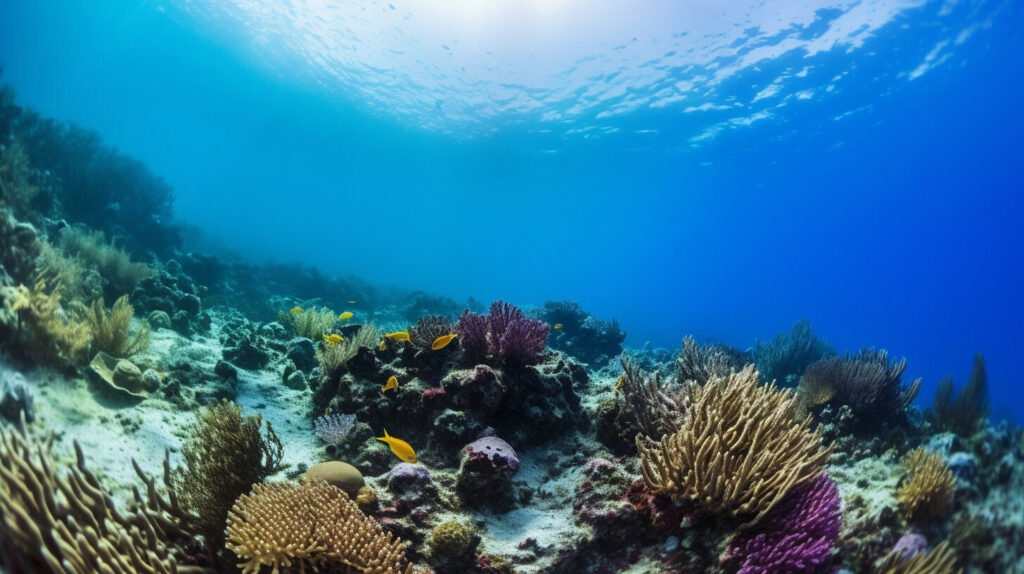
Learning Scuba Diving Techniques for Beginners
Scuba diving can be an exciting and exhilarating experience, but it’s important to learn the necessary techniques to make the most of your time underwater. Here are some essential scuba diving techniques that every beginner should know:
- Breathing Techniques: One of the most critical skills for scuba diving is proper breathing techniques. Learning how to breathe correctly helps conserve air, control buoyancy, and stay calm. Remember to breathe slowly and deeply in a relaxed manner.
- Equalizing Ear Pressure: As you dive deeper, the pressure increases, causing discomfort and even pain in your ears. To prevent this, you need to equalize the pressure in your ears regularly. Use effective techniques, such as the Valsalva Maneuver, to clear the pressure in your ears.
- Monitoring Your Buoyancy: Proper buoyancy control is another crucial technique to master. Keep track of your depth and adjust your buoyancy compensator device (BCD) and breathing to maintain a neutral buoyancy level.
- Clearing Water From Your Mask: Water can get inside your mask, which can be uncomfortable and disorienting. Learn how to clear your mask by tilting your head and exhaling through your nose, which pushes the water out through the bottom of the mask.
- Controlling Your Movements: Be mindful of your movements underwater to avoid disturbing marine life and damaging corals. Use your fins to move slowly and carefully, and keep an eye on your surroundings.
These scuba diving techniques take time and practice to master, but they are essential for a safe and enjoyable dive. Remember to be patient and never rush to learn them.
Choosing the Right Scuba Diving Course for Beginners
If you’re new to scuba diving, it’s important to choose the right course that meets your needs and fits your schedule. With so many scuba diving courses for beginners available, it can be overwhelming to make a decision. Here are some factors to consider when selecting a scuba diving course:
| Factor | Considerations |
|---|---|
| Course Type | Decide if you want a certification course or a trial program to test the waters. Certification courses typically offer more comprehensive training and credentialing opportunities. |
| Course Duration | Determine how long you’re willing to commit to a course. Certification courses can take several days to complete, while trial programs may only last a few hours. |
| Instructor Credentials | Look for an instructor with proper certifications and experience teaching beginner scuba divers. You can also check online reviews or ask for referrals from other divers. |
| Course Content | Ensure the course covers essential topics such as safety procedures, underwater communication, and equipment use. Some courses may also offer additional training on diving skills and techniques. |
| Location | Choose a course that’s convenient to your location and offers suitable diving conditions for beginners. Check for facilities such as a pool or shallow water training areas. |
Once you’ve found a course that meets your criteria, it’s important to contact the dive center or instructor to ask any questions you may have and to confirm availability. With the right scuba diving course, you’ll gain the confidence and skillset to explore the fascinating underwater world.
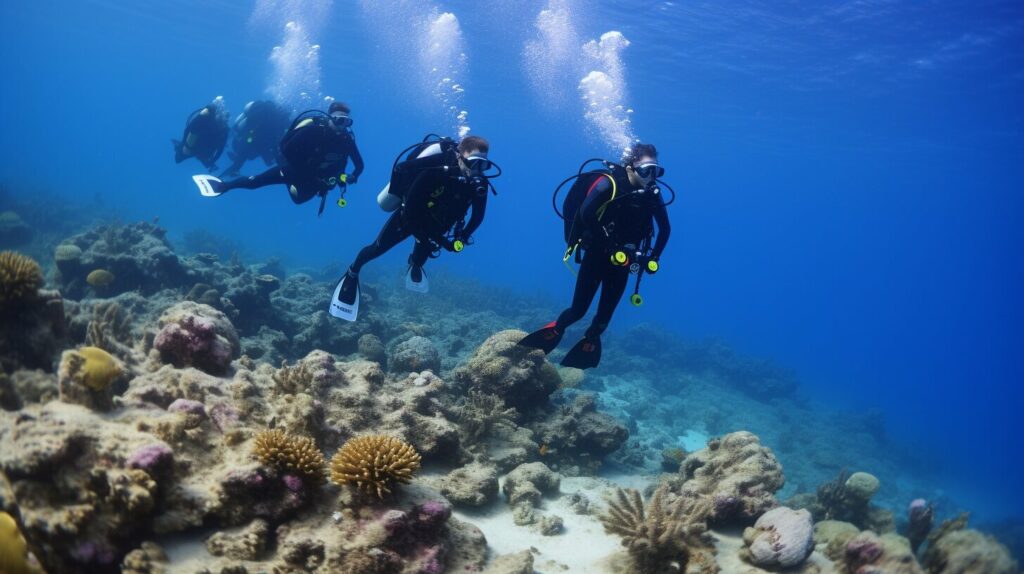
Step-by-Step Guide to Starting Scuba Diving
If you’re ready to start your scuba diving journey, there are several steps you need to take to ensure a safe and enjoyable experience.
Step 1: Find a Reputable Diving Center
The first step is to find a reputable diving center that offers scuba diving lessons for beginners. Look for a center that has experienced instructors, good reviews, and a focus on safety.
You can search online or ask for recommendations from friends or family who have gone scuba diving before.
Step 2: Sign Up for Scuba Diving Lessons
Once you’ve found a diving center you trust, sign up for scuba diving lessons. Beginner scuba diving courses typically consist of classroom sessions, pool training, and open water dives.
During your lessons, you’ll learn essential skills such as how to use scuba equipment, how to communicate underwater, and how to plan and execute a dive.
Step 3: Obtain Your Beginner Scuba Diving Certification
After completing your scuba diving lessons, you’ll need to pass a certification exam to obtain your beginner scuba diving certification. This certification will allow you to dive up to 60 feet deep with a certified dive buddy.
Make sure to choose a certification agency that is recognized worldwide, such as PADI or NAUI.
Step 4: Rent or Buy Scuba Diving Gear
Before your first dive, you’ll need to rent or buy scuba diving gear. Most diving centers offer equipment rentals, but you may also choose to invest in your own gear for a more personalized fit and comfort.
The essential scuba diving gear for beginners includes a dive mask, snorkel, fins, wetsuit, buoyancy control device, regulator, and dive computer.
Step 5: Plan Your First Dive
Once you have obtained your certification and gear, it’s time to plan your first dive. Choose a beginner-friendly dive site with calm waters and easy access to the shore or boat.
It’s important to dive with a certified dive buddy and follow all safety guidelines and best practices.
Now that you know how to start scuba diving, it’s time to take the plunge and explore the fascinating underwater world.
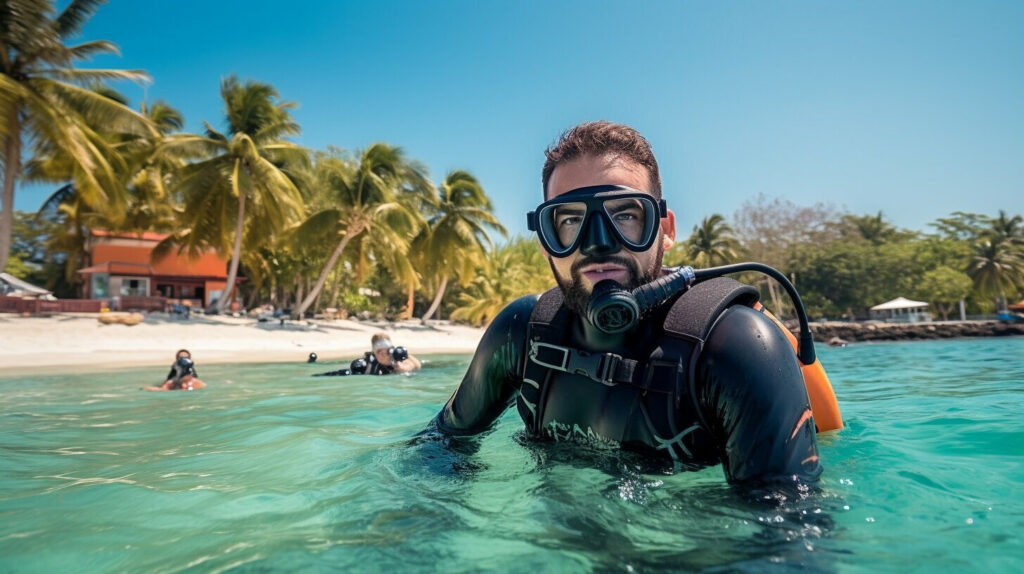
Top Beginner Scuba Diving Destinations
Ready to take your newly acquired scuba diving skills on an adventure? Here are some of the best scuba diving destinations for beginners:
| Destination | Description |
|---|---|
| Belize | Belize’s clear, warm waters and numerous shallow dive sites make it a popular destination for beginner scuba divers. Expect to encounter colorful fish, sea turtles, and vibrant coral reefs. |
| Thailand | Thailand’s warm waters and affordable dive courses make it an attractive destination for novice divers. Discover the underwater world of tropical fish, whale sharks, and fascinating shipwrecks. |
| Florida Keys, USA | The Florida Keys offer a range of dive sites suitable for beginners, from shallow reefs to sunken shipwrecks. Take advantage of the clear waters and abundant marine life, including tropical fish, dolphins, and sea turtles. |
| Hawaii | Hawaii’s warm waters and diverse marine life make it an ideal destination for those just starting out in scuba diving. Explore reef formations, lava tubes, and swim alongside schools of colorful fish and sea turtles. |
No matter which destination you choose, remember to select a reputable dive operator and get acquainted with the local diving regulations. With the right preparation, beginner scuba divers can expect an unforgettable experience underwater.
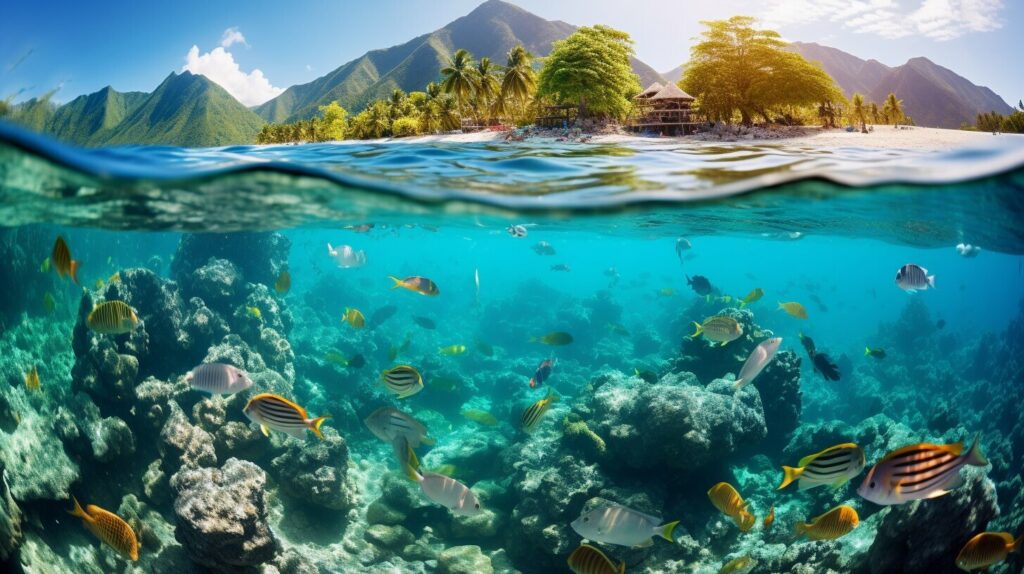
Overcoming Common Challenges for Beginner Scuba Divers
Scuba diving can be an incredibly rewarding experience, but it can also present challenges for beginners. Here are some common challenges that you may encounter when scuba diving for the first time, along with some tips on how to overcome them.
Equalizing Ear Pressure
One of the most common challenges for beginner scuba divers is equalizing ear pressure. As you descend into the water, the pressure increases, which can cause pain and discomfort in your ears. To equalize the pressure, pinch your nose and gently blow out through your nose while keeping your mouth closed. You can also try swallowing, yawning, or wiggling your jaw to help equalize the pressure. Remember to equalize frequently during your dive to avoid ear pain and potential injury.
Managing Buoyancy
Another challenge for beginner scuba divers is managing buoyancy. Buoyancy is the ability to control your position in the water and maintain a level depth. You can adjust your buoyancy by inhaling or exhaling air from your buoyancy control device (BCD) or by adding or releasing weight. To improve your buoyancy skills, practice hovering in place and ascending and descending slowly and smoothly.
Controlling Your Breathing
Controlling your breathing is another important skill for beginner scuba divers. It’s easy to fall into the trap of rapid, shallow breathing, which can lead to exhaustion and panic. Remember to breathe deeply and slowly, using your diaphragm rather than your chest. If you feel anxious or overwhelmed, take a moment to stop, breathe deeply, and focus on your breathing until you feel calm and in control.
Staying Safe Underwater
Safety should always be a top priority when scuba diving, especially for beginners. To stay safe underwater, make sure you follow the guidelines provided by your scuba diving instructor, stay within your limits, and do not exceed your training and experience. Always dive with a buddy, maintain a safe ascent rate, and keep a close eye on your air supply and dive time.
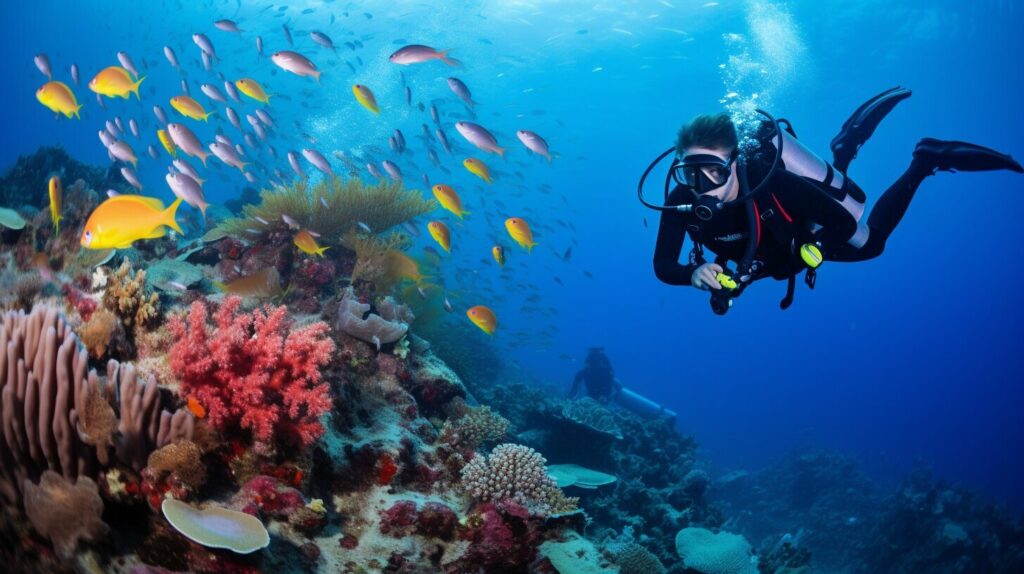
By keeping these challenges in mind and preparing yourself with the necessary skills and knowledge, you can overcome them and enjoy a safe and memorable scuba diving experience. Remember to always respect the underwater environment, take care of your gear, and continue learning and improving your scuba diving skills.
Conclusion
We hope you’ve gained valuable insights into the world of scuba diving and are inspired to take the plunge. Scuba diving can be an amazing activity for beginners, but it’s crucial to prioritize safety and proper training. Always obtain a beginner scuba diving certification and choose a reputable diving center with experienced instructors.
Continue to learn and improve your skills as a scuba diver by mastering essential techniques and exploring new dive sites. With so many incredible destinations around the world, there’s no shortage of opportunities for unforgettable underwater adventures.
Happy diving!
FAQ
Q: What is scuba diving?
A: Scuba diving is a water activity that allows individuals to explore the underwater world using a self-contained underwater breathing apparatus (SCUBA). It involves diving deep below the surface of the water to observe marine life, coral reefs, and other underwater features.
Q: Do I need scuba diving lessons?
A: Yes, it is highly recommended to take scuba diving lessons before attempting to dive. Scuba diving lessons provide essential knowledge and skills to ensure your safety underwater. Proper training will also enhance your overall diving experience.
Q: How do I obtain a beginner scuba diving certification?
A: To obtain a beginner scuba diving certification, you must complete a scuba diving course with a certified instructor. The course will consist of classroom sessions, pool practice, and open water dives. Successful completion of the course will result in a certification that allows you to dive within specified limits.
Q: Why is scuba diving a great activity for beginners?
A: Scuba diving is a great activity for beginners because it offers a unique opportunity to explore the underwater world and witness incredible marine life up close. It can also be a thrilling and adventurous experience that helps build self-confidence and allows for personal growth.
Q: What are some essential gear for beginner scuba divers?
A: Essential gear for beginner scuba divers includes a mask, snorkel, fins, wetsuit or drysuit, buoyancy control device (BCD), regulator, dive computer, and weight system. These pieces of equipment are crucial for comfort, safety, and efficient underwater navigation.
Q: What are some safety guidelines for beginner scuba divers?
A: Beginner scuba divers should always prioritize safety. Some important safety guidelines include diving with a buddy, conducting pre-dive checks, maintaining proper buoyancy, ascending slowly, and following the guidance of a certified instructor or dive master. It’s also important to be aware of your limits and never push beyond them.
Q: What scuba diving techniques should beginners learn?
A: Beginners should learn essential scuba diving techniques such as equalizing ear pressure, controlling buoyancy, proper breathing techniques, hand signals, and underwater navigation. These techniques will help improve your dive skills, ensure comfort underwater, and enhance your overall diving experience.
Q: How do I choose the right scuba diving course for beginners?
A: When choosing a scuba diving course for beginners, consider factors such as the course curriculum, instructor qualifications, safety record, course duration, and cost. It’s also important to read reviews and testimonials from previous students to ensure a reputable and quality learning experience.
Q: What are the steps to start scuba diving?
A: To start scuba diving, you should first find a reputable diving center or instructor. Next, you’ll need to complete a scuba diving course, which typically includes classroom sessions, pool practice, and open water dives. After obtaining your certification, you can begin exploring the underwater world!
Q: What are some top scuba diving destinations for beginners?
A: Some top scuba diving destinations for beginners include the Great Barrier Reef in Australia, the Maldives, the Red Sea in Egypt, the Florida Keys in the United States, and the Similan Islands in Thailand. These locations offer clear waters, abundant marine life, and beginner-friendly dive sites.
Q: What are some common challenges for beginner scuba divers?
A: Common challenges for beginner scuba divers include equalizing ear pressure, managing buoyancy, dealing with strong currents, and navigating unfamiliar underwater environments. With proper training and practice, these challenges can be overcome, and they should not deter you from enjoying scuba diving.
